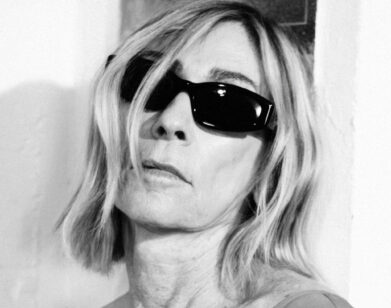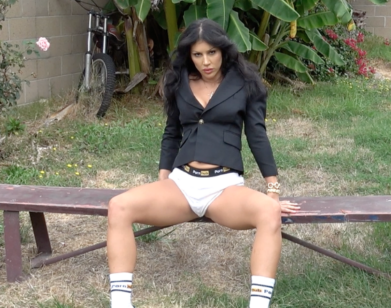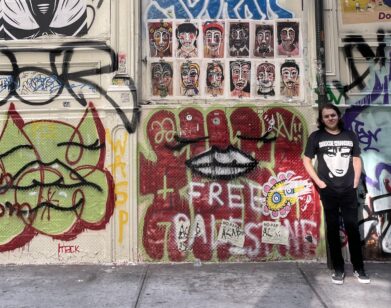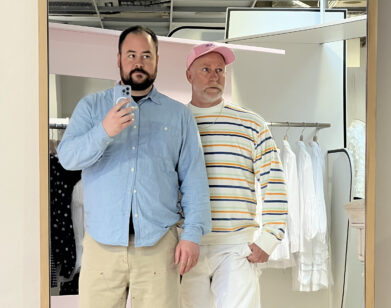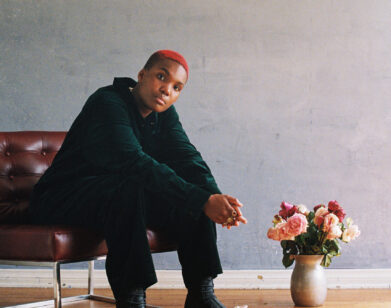The Emancipation of Hayley Williams
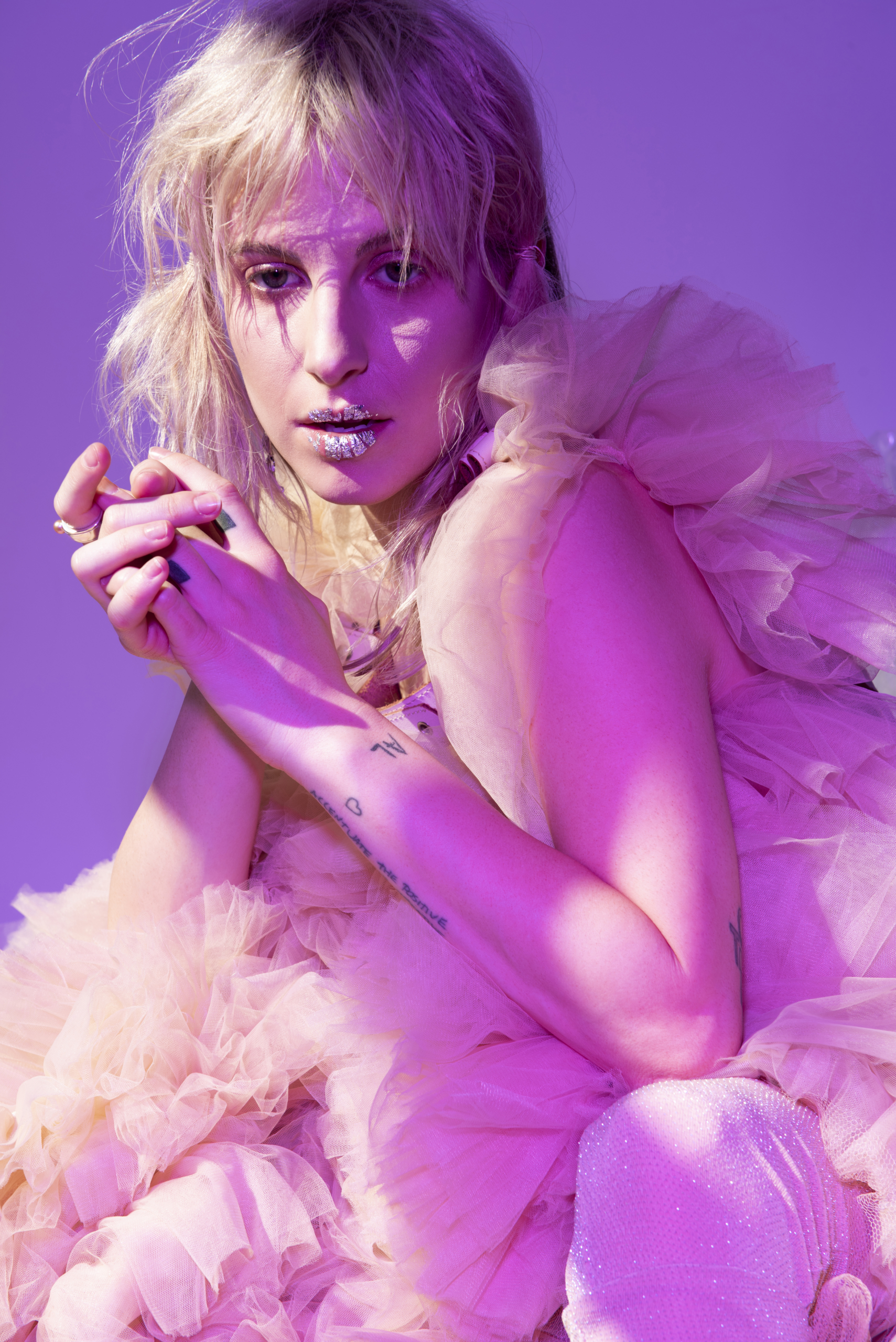
Hayley Williams towers over an empty Times Square. Last week, the singer posted a photo of a Spotify billboard promoting her new album, Petals for Armor, and asked her followers to consider it for “Album of the Apocalypse.” In a pre-pandemic world, countless swaths of passersby would have been tipped off that the frontwoman of the pop-punk group Paramore was releasing her solo debut, but now, there’s an eerie if-a-tree-falls-in-a-forest mood to the whole affair. For Williams, that’s not even the strangest part. “The weirder part was seeing myself up there without Zac and Taylor’s faces next to me,” she says, referring to the drummer Zac Farro and the guitarist Taylor York, the other two members of the band Williams founded in 2004, when she was 15 years old. Since then, Paramore became a global rock act that fought through public drama and a rotating lineup (Farro rejoined the band in 2017 after a falling out) to release 2018’s After Laughter, a deeply personal, ‘80s-inflected album many consider to be the band’s creative peak.
With Petals for Armor, Williams, now 31, has picked up where the last Paramore album left off, digging even deeper into her struggles with mental health, exacerbated by her recent divorce and tamed by therapy and a return to her hometown of Nashville. Williams, who spent her early years as a staple of the Vans Warped Tour, emerges here as a genre-agnostic artist, as comfortable with the electro-pop of “Sugar on the Rim” as she is with the art rock of “Sudden Desire.” Last week, we spoke to Williams from her home in Nashville about adjusting to life in one place after spending so much of it on the road, the disconnect between professional success and personal failure, and why she decided to finally come home.
———
BEN BARNA: A lot of musicians talk about the comedown that happens after a tour, and how difficult it is to adjust to the rhythms of a normal day. Now that you’re in quarantine, every day is normal. How are you adjusting to that?
HAYLEY WILLIAMS: I get this intense emotional whiplash after any tour we come home from because I love to be on the road and play songs for people. There’s no greater high than that. But my body has been put through the ringer for so long. This is the longest I’ve been home since I was 16. Some days I fucking hate it, but other days I’m trying to remember gratitude.
BARNA: The forecasts for when large crowds will be able to gather again are grim. Are you having trouble visualizing playing shows in the near future?
WILLIAMS: Oh my god, yes. It makes me sad because I like going to clubs and seeing bands play. I like when it’s humid and sweaty and gross inside a tiny venue. I have friends who postponed until the end of this year and are postponing again. It’s very anxiety-inducing and too scary to talk about, because we don’t know how these waves will come and go. I can’t think about it for too long. If someone said, “You’re never going to be able to tour again. The future is just putting out music from home and connecting with people virtually,” I would be fucking brokenhearted, but had you told us this while we were three months into our Paramore tour, I’d have been like, “Yeah, man! The future is just staying home, chilling with my dog, and putting out records.”
BARNA: Because you have all this time at home, do you feel pressure to write more songs, or are you letting yourself relax after putting out the record?
WILLIAMS: Definitely the latter. I write all the time, but they’re not fully fleshed-out ideas. It’s a coping mechanism for me, to play the guitar when I’m sad or anxious. Creativity is happening, but I don’t feel any pressure about it. I’m not beholden to my career in the way I imagine people would think I am, because I’ve been doing it for so long. It’s a joy and a privilege, but with both of those things comes the discipline of being human and remembering that I have to be connected with my family, I have to recharge, I have to go through other shit. Just because the record is tied up in a bow doesn’t mean my life is figured out.
BARNA: You’re used to speaking about your music alongside your bandmates. What’s it been like to be the only person representing the music?
WILLIAMS: On the one hand, I fucking talk so much. The guys always laugh at me because before an encore, we take shots of tequila. It was a little tradition for us during the After Laughter tour. And you always knew when I took part, because when I take a shot, I talk even more. But this whole process is just me puking it up. I’m pretty unfiltered these days, and I feel okay about that. If this were a Paramore project, you’re absolutely right. It’s not because I feel ashamed of the work, or because the guys don’t want me to talk, it’s just that it’s not only me, and I love just as much for them to have the light on them. If anything, I love that more. Right now, I’m just letting my fucking mouth flap around, and I’m saying too much. But I don’t ever regret it. There’s no point.
BARNA: Is there a specific moment when you know it’s finally time to let go of an album and move on, and is that process more nebulous now that the traditional markers of releasing and promoting an album don’t exist?
WILLIAMS: The blissfulness of writing some of these songs, the pain of writing some of these songs, that’s all a passing moment. I have to move on to other stories. I think it usually takes me a week or so after the record comes out, because we’re always working so hard the week of release. We’re always doing extra press, last-minute promotions, but once that’s over, there’s this quiet moment where the real release happens for me. I already wrote on Instagram, in a letter to the fans, “This is yours. Please take care of this. This is a really major part of my life but it’s time to move onto the next.” The truth is I say that, but it still takes me a bit of time to live that down.
BARNA: Were there conversations with your label about pushing the release date of the album?
WILLIAMS: There were conversations, for sure. But what’s crazy is that I’ve been on the label since I was 15 or 16, and they know Paramore doesn’t do things the way that the rest of their artists do things, and that’s been a point of frustration many times over, but it’s also been an opportunity for us to gain their respect. So when this happened, I’ll never forget it, the whole team got on a call and they sort of asked me what we should do. I felt really humbled by that, and obviously a little intimidated because I’m talking to people who know what the hell they’re doing. But it was crazy to feel like all that trust was being put on me. They gave me some suggestions, but I was like, “Look, man, the content that Lindsey [Byrnes, Williams’s creative director] and I made, I’m really happy to get out there. And we have songs that I really believe in.” I was like, “At the end of the day, this is just a story to share with people. I’m sad, too. The world is falling apart. Our planet is on fucking fire. If this offers any comfort, or is any bit of relief, then I want to do that. I think it’ll help me, too.”
BARNA: How’s it going to feel when you have to tour this record somewhere in the distant future, when most likely you’ve already moved on to the next thing?
WILLIAMS: I’ve never had that experience. With Paramore, we finished albums and four or five months later they would come out, so even that felt excruciating. This is a whole different animal. I’m going to be doing a livestream thing, but the thing is, I don’t want to do livestream shows that feel like they’re from my bathroom. The whole point of going on tour and putting together this spectacle for people is about bringing the emotion of each song into a 3D space, to make them pop and come to life. When I saw Thom Yorke in Atlanta last year, I looked up and the screen was massive, and there were all these beautiful images, or colors and graphics, flashing by while his music was doing this whole other thing to me. Good shows like that, they feel different. I’m so happy that artists are getting the chance to connect in a very real way with people, but I’m starting to really miss the artfulness and the spectacle of bringing songs to life, so I’m trying to put together something that feels that way, because I don’t want to wait until 2021, or potentially even longer, to be able to give these songs a representation that is immersive and beautiful.
BARNA: What was it like to see billboards of yourself in an empty Times Square?
WILLIAMS: It’s so dystopian. I’m kind of into it in a very twisted way. I guess the weirder part was seeing myself up there without Zac and Taylor’s faces next to me. I’m secretly hopeful that something glitches and then when the world ends it’s just my face in this futuristic apocalypse where there’s just a flashing billboard that says “Petals for Armor.” I’m weirdly into that, but I hate that New York is shut down.
BARNA: Does it turn you on that some people will be discovering you for the first time as Hayley Williams, without any knowledge that you’ve been the frontwoman of a very successful band for most of your career?
WILLIAMS: Absolutely. In fact, Taylor and I talked a lot about that because the stuff. We’d be working on certain songs saying, “This is shit that I always wanted to make but didn’t think that I could.” When we were goofing off and writing “Sugar on the Rim,” I’m on synth bass and he’s over there on a sampler, and we looked at each other like, “What is happening right now? What music are we making? This is so different.” I’m really into the fact that people who probably don’t like Paramore could potentially put this on and be like, “This is my shit.”
BARNA: Were you worried that putting out a solo record might lead people to believe that the band had broken up?
WILLIAMS: I’ve tried to make that clear, but people have been thinking that Paramore has broken up since 2009, so what can I do? I’m very happy with where the band is at. There’s a different sort of confidence about the band these days than there was when we were trying to prove that we were okay to everybody.
BARNA: For the album’s rollout, you went with a more traditional, drawn-out release, in an age where the surprise album drop has become a staple of the music industry. Why did you choose to release this album in stages?
WILLIAMS: Look, I don’t think there are rules anymore. And if there are any left, there shouldn’t be. Whether you’re in hip-hop and you’re putting out mixtapes, or you’re a country artist and you’re still doing the traditional thing—I just heard Kenny Chesney sold over 200,000 records in the last week, and I was like, “What? Bitch!” There are no rules, there’s only music. There was a time when I thought I was only going to write a couple songs and throw those up under a different name and put them on Spotify. I just don’t care about any of that anymore. I could give a shit about charts, even though it’s rad when you get placed high up. All that stuff is a bonus, and I’m lucky to have felt those milestones happen. Paramore has had a lot of cool success stories and we’ve also had years where we didn’t really do that much. I’m not longing to achieve something insane anymore.
BARNA: You came up in a music industry where the amount of records sold was the main barometer for success, but that pressure to sell a huge amount of albums in the first week doesn’t really exist anymore. Is that a relief?
WILLIAMS: I’m very grateful Paramore grew up on the cusp of a whole new music industry, but we still got to enjoy some of the way it used to be, because that was what we grew up seeing. All of the artists we idolized and aspire to are not mainstream success stories. You could look at Radiohead and you say that they’ve had huge songs, but it’s not like you’re hearing them on the radio. I’ve been around long enough to know that those numbers don’t make my life better, and that’s all the proof that I need to know that that is not success. Success is measured in me laying down my head at night and being like, “Oh fuck, I wrote the best song of my life today, and I don’t want to die anymore. I just want to go to bed, wake up tomorrow, and eat breakfast.”
BARNA: I read a review the other day that said the album feels like meeting Hayley Williams for the first time. Do you feel like you’re introducing yourself to us for the first time?
WILLIAMS: Oh man, that’s a good question. I feel like After Laughter was the moment where I started to let myself be known. I think the guys feel that way, too. It really felt like that was the first time our band had autonomy apart from the hype and the industry, and also from who we had been for so long in the public’s eyes. Before we wrote After Laughter, we were so sick of the grind, and so sick of the family drama of Paramore and the fact that most of the world only knows us for wearing skinny jeans and “Misery Business.” So After Laughter was when I said, “Okay, now we’re in a relationship. Let me let you know how fucked up I am.”
BARNA: You began your career writing music songs with people in Nashville. We published an interview with Lucinda Williams recently, where she said a lot of those Nashville cowriting sessions are bullshit, because people are just there to get their names on a track, rather than the pure desire to write a song. Do you find that songwriting can be a collaborative effort, or is it purer if you’re in a room by yourself, pouring your heart out?
WILLIAMS: Big meetups and big co-writes give me the heebs. It’s not my bag. To go in and meet people who do that for a living and be expected to deliver something emotional and personal, that’s beyond me. This town is made of songwriters who are good at the business of songwriting. I’d rather be by myself or with people who I have intimate friendships with and not feel like this is an appointment. I just don’t know how to do that.
BARNA: You lived in Los Angeles for a spell, but are now back home. What brought you back to Nashville?
WILLIAMS: I thought that I was going to get married, and I thought maybe I’d just live a simpler life near my family. I tried L.A. for a while to be closer to my ex, and I was really lonely. I love California and I have really great friends now, but it’s mostly because a lot of my friends from Nashville are in L.A. I tried to make it work, but it was pretty unhealthy for me. I came back in 2015 to get married and do the domesticated thing, and honestly, if that had been the right relationship or a healthy place for me to be in, I would have been fine. But I actually was pretty miserable the first year coming back home. I thought, “Holy shit, Nashville’s completely changed, it’s not a small town anymore. It’s a big city with tons of construction, my life is falling apart, and I don’t know why I’m making the decisions I’m making in my personal life.” But I’m so glad I stuck it out and I didn’t go running back to California after my divorce, because I do have a true community here.
BARNA: What’s it like to experience professional success when your personal life is in turmoil?
WILLIAMS: You just feel like a big phony. The truth is, especially with albums before After Laughter, I really did want people to feel good listening to Paramore. I wanted to play shows for people with my friends, and be a safe place for people. That felt genuine to me until one day it didn’t, and suddenly it was like, “Shit, I’m a fake.” Being able to open up about what that feels like was truly the catalyst for a deeper connection. For us to come together and be honest about what it felt like to not be in a good place personally, but then have all these opportunities, that was really helpful. I don’t do things the way I used to. I’m pretty real about if I’m feeling like shit or if I’m going through something. I protect the things that are important to protect, but I try not to fake it with people anymore because that just makes me feel like shit.
BARNA: When you set out to make a new album, how aware are you of current trends in pop music, and do you try and lean in to them or steer clear of them?
WILLIAMS: In the case of both Paramore and Petals for Armor, as we’re writing, ignorance is bliss. We don’t pay attention to anything. In fact, most of the stuff that we’re drawing from is so old. Some of the bigger, poppier songs were mostly inspired by early Björk albums. I’m just not interested in a ton of new pop music. I know how ignorant that sounds, but it’s just not generally on my radar.
BARNA: Finally, I have to ask you, what have you been cooking in quarantine?
WILLIAMS: I’ve reached that point where every evening is an episode of Chopped, where I just open up the cabinet and I’m like, “Okay, what the hell is this?” And there are just scraps that go into a pot. But my favorite thing is to roast everything in the fridge. So I’ll roast a whole damn onion, I don’t even give a shit. I’ll eat the whole onion with a fork. As long as I have dinner on the table, I don’t care.


